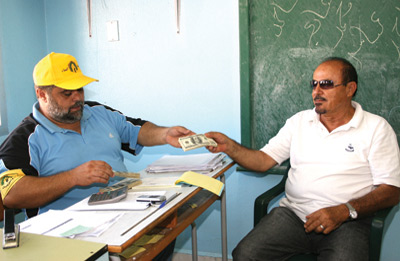|
|
Jihad al Binaa vehicles
and bulldozers were working in cooperation with
the municipalities in towns, army vehicles, and
other official apparatuses to remove the rubbles
from the [southern] suburb's roads, and to build
new dirt roads alterative to the demolished
bridges in the south, before returnees to their
cities, villages and suburb in August 14.
Meanwhile, another team from Jihad al Binaa had
already started surveying the initial damages of
the field war.
Jihad al Binaa and the
resistance wouldn’t ever abandon their nation
that is passing through the toughest ordeal –
families without homes or with houses without
walls, coming back after being displaced by
force – this nation insists that all what has
happened and is happening is a sacrifice for the
resistance, its leader, and this path. Jihad al
Binaa didn’t wait for the government's treasury
of administrative routine to take action,
although the aim behind Jihad al Binaa's
interference was not to cause a problem between
the people and the government, but to provide
their return with pride and dignity – for time
was not on the side of anyone; the month of
Ramadan was approaching, and so was winter!
Therefore, the housing
compensations were paying according to the
initial surveys of demolished buildings, which
Jihad al Binaa was capable of accomplishing it
in an unprecedented period of time.
Compensations were settled without any
complications to $12,000 in Beirut (representing
$4,000 for annual rest, and $8,000 for the
furniture), $10,000 in the south ($2,000 for
rest and $8,000 for furniture). They settled to
the documents essential to identify the
individuals and their demolished buildings, and
in one month, compensations were paid for more
than 12,000 individuals.
It is worthy to mention
the obstacles facing the organization in the
southern part of the [Laytani] River including
the delay of "Israeli" troops' withdrawal from
that area and the permanent threat left behind
represented by cluster munitions; which delayed
the quick return of that area's people.
Jihad al Binaa took into
consideration that not any side can directly
start reconstructing due to the hugeness of this
file, with reference to the more than 120,000
affected units including houses, shops,
institutions and others, yet they should hasten
its implementation.
In this context, the
organization cooperated with the owners of the
houses in the sense that each person managed the
[reconstruction] project at his house or
institution. Compensations were paid according
to the damages estimated in the forms, knowing
that Jihad al Binaa took into consideration that
the people alone cannot bear the burdens of
reconstruction alone, especially that many of
them lost their means of living during the war.
In six months of
exhausting work, Jihad al Binaa was able to fold
the sensitive stages of a huge project. The
Zionist enemy thought it could defeat
determination of a nation that sacrificed their
blood for the sake of resistance; then how can
it not sacrifice their homes?
|